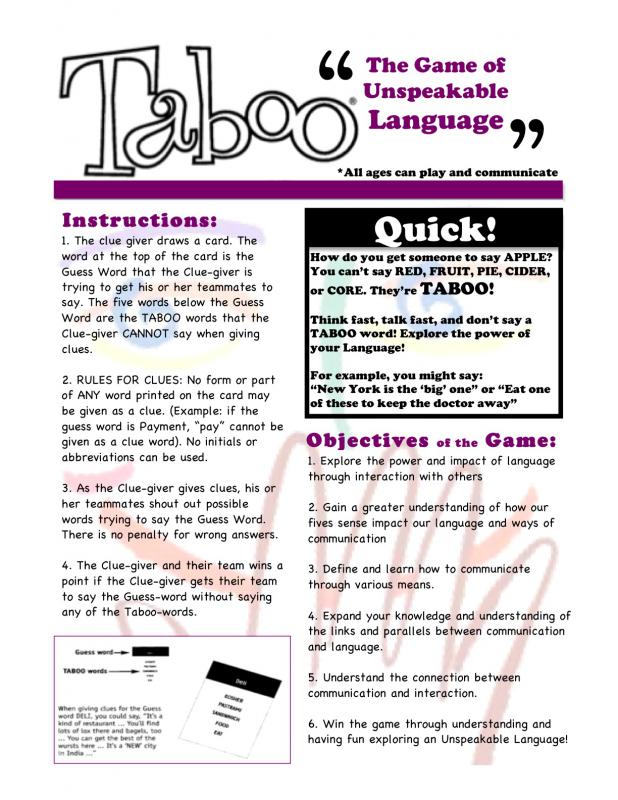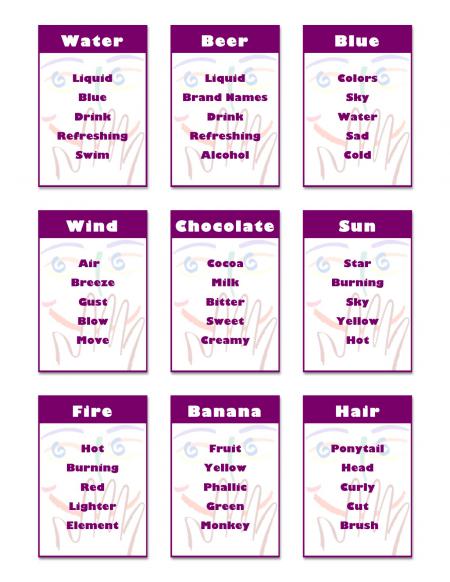Serendip is an independent site partnering with faculty at multiple colleges and universities around the world. Happy exploring!
The Game of Unspeakable Language

Describe salt to someone who has never tasted it before. How does it feel on your tongue? How does it feel going down your throat? What does it make you feel? What does it taste like? I can’t do it…no matter what words I use or how I choose to describe it, someone who has never tasted salt will not fully understand what it tastes like. This concept, this shortcoming of language felt really disappointing. I thought that language was supposed to be empowering; having a voice, having words, using them to tell people what I think, what I feel…it’s supposed to make me stronger.
In class I argued that language is limiting. I felt disappointment in this argument, not because I didn’t believe it, but because I felt powerless within a second of trying the describe salt. Language truly is not enough of a form of description, yet it is the most commonly used method of communication amongst people. Why is this? Why do we use language if it limits us in our communication?
Have you ever heard of the game Taboo? It’s a card game that uses words. One person is given a word that they are meant to describe to a group of people without using that word, or words that are closely associated that word. So, if we were trying to describe salt to a group of people, we wouldn’t be able to say the word salt, or pepper, or white, or sea etc. This game truly shows the limitations placed on us by words.
The rules of the game Taboo can be found at this site (Taboo Rules). In looking at this project I’ve decided to make my own version of Taboo. I’ve changed some of the rules, as you can see. Since I am purely trying to look at words, I changed the original rules. While in the original game, hand gestures and noises are not allowed, in my version they are. The only limitations of this game are the words that are not allowed in describing the goal word.

I also created game cards to go along with this game and my plan was to have a group of people play. Before I tried this, however, I wanted to try it out on a friend. Watching a person struggle when at a loss of words, literally, is not a good experience. I know that this game is just a game, but the loss of words, the inability to express one's self is a reality. The cards I made for this game can be seen at the top of this page.
So, language truly is limiting? When trying to describe water, without using the words liquid, blue, drink, refreshing or swim, I found that the descriptions given were all based on an experience. Some people chose to describe a shower, or sometimes a brand name, or the ocean. However, when I asked them what water tasted like, they were at a loss for words. The same was true for the taste of chocolate, the feel of wind, the smell of a banana etc.
So what if this game shows that language has its limitations. What I discovered was much more than this limitation. This project that I started was merely looking at language as either a limiting practice, or one that is empowering. What I've found, however, is a great deal more than I expected. If I had tried to describe the taste of chocolate to someone who had never tasted it, my language would limit me. I wouldn't be able to get across the true feeling of eating chocolate, the true taste of how it feels. However, I would have sparked a curiosity in this person by giving them a word that they truly did not understand. Could this lead to learning? The curiosity of knowing the word 'chocolate' yet not understanding the experience of chocolate could then lead this person to want to experience it. This person could then go and find chocolate and eat it. Without ever trying to describe it, without having a word for it, what is the alternative for this learning? For this curiosity?
Language is based on a complex set of rules used to related symbols to meanings. This to me suggests that there are an unlimited number of possibilities in creating symbols and attaching meanings to it. However, we as humans have gone beyond this system and attached meanings to the meanings of symbols. Specific connotations that relate a word that had a single meaning in its origin, to now having several different meanings. We as people have the power to expand and limit language in the way we have seen fit. We started with a man and a woman. It is no longer the case that these are the only two genders in existence. We have created new words: transgender, transsexual, queer etc. This to me shows that we are more than capable of expanding our language, to creating new words and new meanings.
So, is language limiting? I believe that yes, it is limiting at times, but also empowering. In the game I created, the words I chose to take away limited those people trying to describe something. I chose to limit these people in their descriptions and yes, maybe even with these words they would have not been able to truly explain the feel of the wind on their skin, or the taste of beer, or the sight of blue, but this does not change the fact that those words would have empowered them to try. Even when we fail at our description, we might induce a curiosity that could ultimately lead to a true experience of a word. The true taste of chocolate, the true feeling of watching the sun, or the true feeling of smelling a fire.
Ultimately what I've learned is that language may be limiting, but people are the reason behind it. We have created this method of communication and succeeded, for the most part, in using it. Words help us get our ideas across and it is a very intelligent process. However, we are capable of expanding what we already have. We are capable of creating new, different, more inclusive language. In The Book of Salt, Truong has truly allowed me to feel the words, to taste the words without focusing too much on the meaning, or the story. I think, however, that this has been a different experience for me than we discussed in class. It is not that I haven't felt the story, read the words, seen the characters. It is the meaning that people add to the already existent meaning of words that became invisible. The assumptions that have been embedded to language culturally. These were the meanings that I felt less in the words.
Now, I still feel a bit confused. Language is limiting and I've had my problems with it, yet I cannot find an alternative. If an alternative did exist, how would people use it? What limitations would we place on this new method? Or can we just expand what is in existence to create a less limiting language?




Comments
Losing words, playing with language
aybala--
Very clever here, to create a new version of Taboo in order to demonstrate, so concretely, the struggle of losing words, the shortcoming of language.
Stepping off from a different direction--the work of the French feminists--two of your classmates also took some time this month to meditate on language's limits (see michelle.lee's Look Into Language) and power (see epeck's In the defense of language). It would be interesting to get the three of you working together on this conundrum!
I guess what strikes me first about your project is the binary you use to frame it: you begin by positing that language is "either a limiting practice, or one that is empowering." By the end of your webevent, you've come to recognize that it is precisely these limits that might be the source of creativity: it's not just "even if" we fail, but BECAUSE we (always!) fail that we are motivated to generate the sorts of "work-arounds" we have to come up w/, when trying to apprehend an experience we have not had, or to expand the old meanings of words. These are the ways in which we find ourselves (as you say) "creating new, different, more inclusive language." Failure becomes the motivation for invention --or, as Laurie Anderson so famously says,
You're walking. And you don't always realize it, but you're always falling. With each step you fall forward slightly. And then catch yourself from falling. Over and over, you're falling. And then catching yourself from falling. This is how you can be walking and falling at the same time.
Your own earlier project on how the category "woman" has altered over the course of Bryn Mawr's history, expanding slowly to include not only only the well-to-do white women who originally constituted the whole category, but also women of various nationalities, races, religions and classes, is surely a case in point.
So: where to from here? And how?